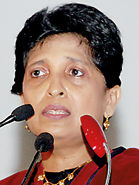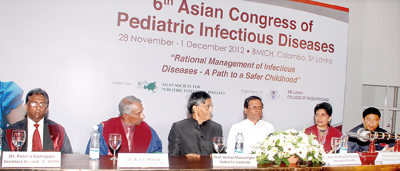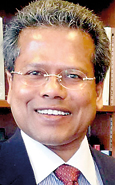News
Leaving a better world for our children
By the turn of the century, based on current consumption patterns, the average temperature of the world is expected to go up by around three degree Celsius. Sea waters may also rise by two metres. Addressing the gathering that included health specialists from all over the Asia Pacific region on Wednesday, 2007 Nobel co-laureate Prof Mohan Munasinghe, who linked paediatrics to global warming and sustainable development, warned that it was not only our children who will have to bear the consequences of our current over consumption.

Prof. Fernando delivering the welcome address
He was speaking at the inaugural session of the sixth Asian Congress of Pediatric Infectious Diseases (ACPID) that was held at the BMICH from November 28 to December 1, on the theme of ‘Rational Management of Infectious Diseases- A Path to a Safer Childhood’.
The renowned economist, who was the keynote speaker said building a safe and healthy future for our children was not limited to providing the best medical care for them.
“Economic crises, poverty, environmental pollution, conflicts, mass migration, climate change and unsustainable urbanisation ,all have a far-reaching impact on our children,” said the professor who introduced the concept of ‘sustainomics’.
Earlier, setting the mood for the three-day conference on paediatrics, chirpy schoolchildren dressed in colourful clothes welcomed the delegates with a heartwarming stage performance.
In her welcome address Sri Lanka College of Paediatricians President and Chairperson of the organising committee, Prof. Asvini D. Fernando said the three day confab will among other things cover discuss new infections and the emergence of antibiotic resistance.
“Improper use of antibiotics has led to the surfacing of resistance. There are no completely new antibiotics and won’t be in the near future therefore the use should be rational,” she warned.
Pointing out that 70 percent of infant mortality in the country was due to neonatal deaths, Prof. Fernando called on the state to allocate more finances to improve Sri Lanka’s neonatal services. A child’s place of birth should not determine their access to better health, she stressed.
Prof. Fernando also read out President Mahinda Rajapaksa’s message which lauded the conference for dealing with a pertinent issue with regard to child health in developing countries.
Meanwhile, Chief Guest Health Minister Maitripala Sirisena said the gathering would provide useful findings on paediatric infectious diseases that would be helpful to countries in Asia Pacific.
Getting down to business
Experts from 32 countries including Afghanistan, Australia, Bangladesh, China, Finland, India, Israel, Iran, Japan, Korea, Malaysia, Netherlands, Pakistan, Philippines, Saudi Arabia, Singapore, Sri Lanka, Taiwan, Thailand, United Kingdom and the United States participated in the three-day event organised by the Asian Society for Paediatric Infectious Diseases and the Sri Lanka College of Paediatricians.

The headtable including Prof. Mohan Munasinghe (third from left), Minister Maithripala Sirisena (thrid from right) and Prof. Asvini D. Fernando (2nd from right). Pix by M.D. Nissanka
Sessions on neonatal infections, dengue, respiratory tract infections, diarrhoeal diseases, oral polio vaccine, paediatric HIV and tuberculosis, viral hepatitis, fungal infection in children were conducted by internationally-known experts. In addition, discussions on antibiotics, new developments in vaccines and other fields were also discussed.
Participants also learnt about the latest research in H1N1 Flu, dengue fever, Hepatitis B, Influenza, Tuberculosis, HIV/AIDS, and other topics.
Delegates who addressed the conference included Prof. Ada Yonath, winner of the 2009 Nobel Prize in Chemistry and Director of Helen and Milton A. Kimmelman Center for Biomolecular Structure and Assembly of the Weizmann Institute of Science; Prof. Zulfiqar A. Bhutta, who is Husein Laljee Dewraj Professor and Head of Division of Maternal and Child Health, Aga Khan University Medical Center, Karachi, Pakistan; Prof. Anupam Sibal, senior consultant, Paediatric Gastroenterology and Hepatology, Apollo Centre for Advanced Pediatrics, India and Prof. Ben J. Marais, Associate Professor, Paediatrics and Child Health, Children’s Hospital, Westmead, University of Sydney, Australia.
“Since 2011, the world, according to Prof Munasinghe, has seen seven million children (below five years of age) die. It is high time for us paediatricians to act and ensure a healthy life and clean environment for the innocent souls,” a delegate from Australia told the Sunday Times.
Follow @timesonlinelk
comments powered by Disqus

























